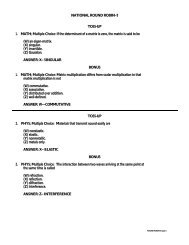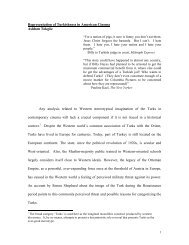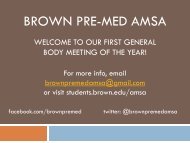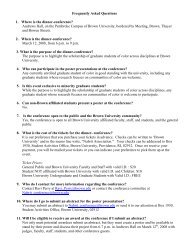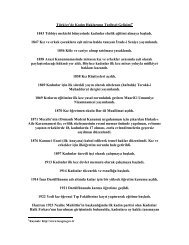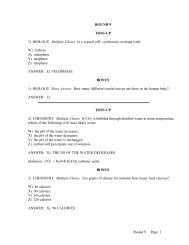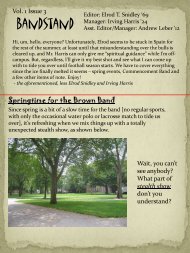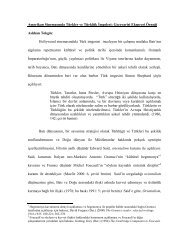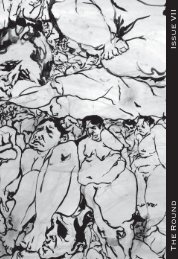Download as a .pdf file - Brown University
Download as a .pdf file - Brown University
Download as a .pdf file - Brown University
Create successful ePaper yourself
Turn your PDF publications into a flip-book with our unique Google optimized e-Paper software.
27<br />
Contemplative Judaism<br />
in the United States, although Jews are only about two percent of the<br />
United States population. 11 This phenomenon, sometimes referred to <strong>as</strong><br />
“Jubuism,” h<strong>as</strong> been a fruitful path for many people. In addition, many<br />
Jews have searched within Jewish text and tradition, and this h<strong>as</strong> brought<br />
about a revival and, in many ways, a reconstruction of contemplative<br />
Judaism. In this paper, I will discuss several methods and concepts in<br />
Jewish contemplative practice. They are derived from ancient and premodern<br />
sources, yet continue to enrich the lives of many Jews today.<br />
Some of the most awesome and mysterious Jewish mystical practices<br />
involve the contemplation of ayin: the Jewish conception of nothingness.<br />
One cannot rationally or objectively contemplate ayin, however, for it is<br />
impossible to define and must be experienced subjectively. It is <strong>as</strong>sociated<br />
with another term in Jewish mysticism, ein sof, which means “no end,” or<br />
infinity. The concepts of ayin and ein sof may shed light on the nature of<br />
YHVH. Daniel Matt writes, “Since God’s being is incomprehensible and<br />
ineffable, the le<strong>as</strong>t offensive and most accurate description one can offer is,<br />
paradoxically, nothing.” 12 Conceiving of the Divine <strong>as</strong> ayin challenges the<br />
temptation to anthropomorphize God or perceive God <strong>as</strong> finite. Although<br />
one can discuss God’s behaviors and attributes, “these are all descriptions<br />
about what God does and how He acts, but not what He is.” 13<br />
Since YHVH is the creator and source of all things, God is no-thing,<br />
yet all things are expressions of God. The sixteenth century Kabbalist,<br />
Moses Cordovero, wrote, “God is everything that exists, though everything<br />
that exists is not God. It is present in everything, and everything comes<br />
into being from it. Nothing is devoid of its divinity. Everything is within<br />
it; it is within everything and outside of everything. There is nothing<br />
but it.” 14 If the Jewish mystical conception of God seems to be wrought<br />
with paradox, this is not a problem, for God creates logic and therefore<br />
transcends logic. 15 God knows no dualism, for God is not subject to<br />
dimensions of time or space. “At the deepest levels of divinity, all opposites<br />
and distinctions vanish, overwhelmed by oneness.” 16 The size and scope<br />
of YHVH can only be called Ein Sof. YHVH can only be experienced <strong>as</strong><br />
Ayin.<br />
Ayin h<strong>as</strong> profound implications for the Jewish concept of self.<br />
Kabbalists believe that the body is not the self, for I can speak of “my<br />
body.” The same can be said about the mind and even the soul: “I have a



